Established in the early 1900s, Albemarle/Charlottesville 4-H’s programming initially focused on home economics and agriculture, later expanding with an added emphasis on youth contests, livestock, crops, and school-based learning. Supported by the Virginia Cooperative Extension (VCE), a statewide educational outreach program through Virginia Tech and Virginia State University, the organization now offers an extensive selection of hands-on informal learning experiences that promote leadership and citizenship while teaching life skills.
“Our work spans urban and rural communities, and our mission is to empower youth to become confident, capable, and compassionate citizens through real-world experiences, said Sarah Brown, 4-H Education and Outreach Facilitator. “We empower youth to lead, we’re deeply rooted in our community’s traditions and values, and we’re constantly evolving to meet the needs and dreams of tomorrow’s leaders.”
Led by Brown and Extension Agent Sam Leech, Albemarle/Charlottesville 4-H offers everything from traditional livestock projects to STEM, art, and civic engagement programs, all with an eye on building resilience and confidence. “In 4-H, youth first build the confidence to try new things, and with time and support, many become true masters in their chosen areas,” Brown said. “Parents often share how this newfound confidence inspires young people to take on exciting opportunities, whether competing in state horse shows, participating in national rabbit ARBA Rabbit competitions, or boldly stepping up to lead a bluegrass jam session with strangers.”
Participants in the 4-H programs are also able to develop other skills that will last a lifetime. “Here, youth don’t just learn about leadership, they live it. They don’t just study science or agriculture -- they apply those skills to real-world challenges, working side by side with caring adult mentors who guide and inspire their growth every step of the way.”
For Albemarle/Charlottesville 4-H, volunteers are at the center of everything that the organization provides in roles that range from club leaders and event organizers to mentors and role models. “Here in the Charlottesville area, we are incredibly fortunate to have dedicated volunteers who believe deeply in our mission, Brown said. “Our programs simply wouldn’t be possible without their support and commitment.”
Albemarle/Charlottesville 4-H also interacts with the community in a multitude of ways. It has formed partnerships with Camp Albemarle, James Monroe’s Highland, Ivy Creek Foundation, Habitat for Humanity, area schools, churches, farms, and nonprofits, all with the purpose of providing learning experiences that are both hands-on and meaningful. The work of 4-H participants can also be spotted at numerous local events, including the Grace Church Historic Farm Tour, the Albemarle County Fair, Fall Foxfield Races, and agricultural education days at Charlottesville High School. Additionally, youth involved with the organization participate in volunteer activities throughout the area. “Our youth are actively engaged in service projects, community cleanups, and civic outreach efforts, such as planting trees with the Rivanna Conservation Alliance, sewing cage comforters for the CASPCA, and sewing pillowcases for the Shelter for Help in Emergency,” Brown said. “Our clubs have also prepared meals for PACEM.”
While the local 4-H has been operating for over a century, it is continuously expanding. Brown says that it has established a new Albemarle/Charlottesville 4-H Livestock Leadership Association that teaches youth production livestock skills and practices that can be useful within the industry as well as in other facets of their lives. It has also added a new Nature Project Group in the Western Albemarle Community Club that works with a Rivanna Master Naturalist to deliver educational content on ecosystems and the environment. In terms of future initiatives, the organization’s leaders hope to expand access to underserved communities, increase opportunities in emerging areas like agri-tech and civic innovation, and create a permanent facility that will be a hub for youth leadership, agriculture, and community education.
From helping youth acquire practical skills to building confidence and knowledge in a hands-on environment, Albemarle/Charlottesville 4-H offers broad benefits for members. But Brown believes that powerful connections are at the heart of what makes the organization special. “What truly sets our Albemarle/Charlottesville 4-H program apart is the deep, lasting relationships we cultivate,” she said. “We believe in the power of every young person, regardless of their background.”
Those interested in learning more about programs, camps, and clubs can reach out to the Albemarle Cooperative Extension Office or visit the website, bit.ly/Albemarle4H. Community members can also volunteer their time, host events, sponsor awards or supplies, or spread the word about what 4-H offers.
We empower youth to lead, we’re deeply rooted in our community’s traditions and values, and we’re constantly evolving to meet the needs and dreams of tomorrow’s leaders.
